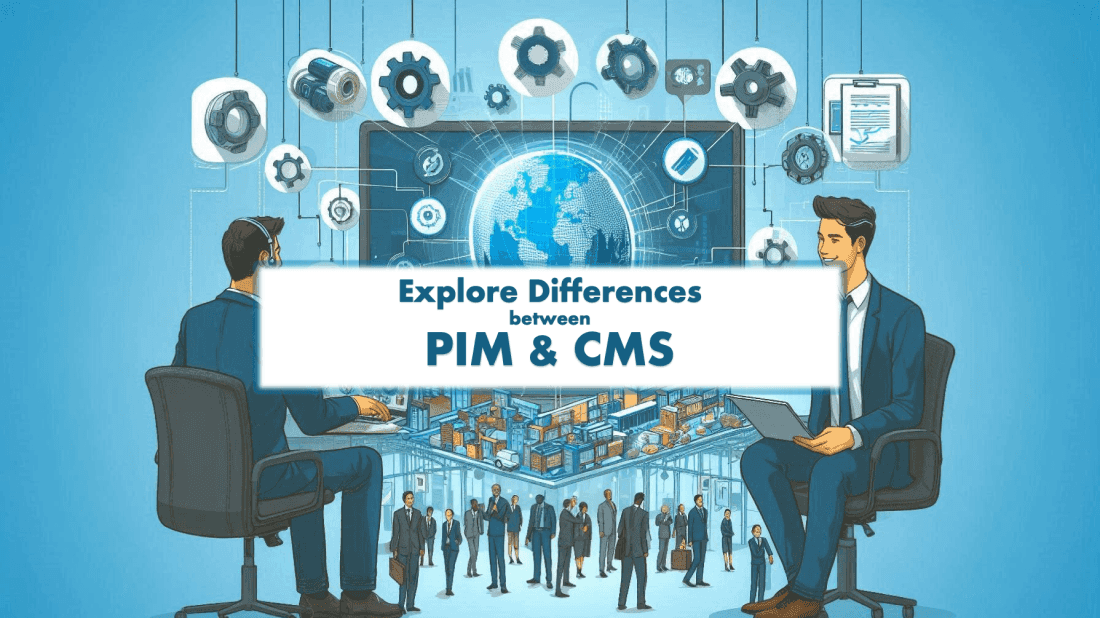Jun 8th, 2024
Transforming Product Data Management for B2B Manufacturers
Categories:Product Information Management SystemIn the modern manufacturing landscape, efficiently managing vast amounts of product data is a significant challenge.
For B2B manufacturers, a robust Product Information Management (PIM) system can provide a strategic advantage by centralizing, standardizing, and enhancing product information. This transformation in data management streamlines processes and boosts competitiveness, making PIM an essential tool for manufacturers.
Understanding PIM Systems: An Overview
A PIM system is a comprehensive tool designed to help manufacturers gather, store, manage, and distribute product data from a single, centralized platform. By integrating data from various sources such as ERP systems, supplier databases, and spreadsheets, PIM creates a single source of truth for all product-related information. This ensures consistent product information across all channels and departments, which is crucial for maintaining accuracy and reliability.
Key Features of PIM Systems for Manufacturers
Data Consolidation and Standardization
PIM systems excel at consolidating product data from multiple sources, providing manufacturers with a unified view of their product information. This feature ensures that all departments have access to consistent, accurate data, enhancing decision-making and operational efficiency. Moreover, PIM solutions help manufacturers standardize product information by creating templates and rules for data entry. This standardization ensures that all product details are consistent and easily understandable across different channels and stakeholders.
Data Enrichment and Governance
Enhancing data quality is a critical function of PIM systems. They fill in missing information, correct errors, and provide tools for data enrichment, leading to more accurate and comprehensive product information, which is crucial for marketing and sales efforts. With robust governance and workflow capabilities, PIM systems allow manufacturers to define user roles, set approval processes, and maintain data integrity. These features reduce errors and ensure that only accurate information is disseminated across the organization.
Multi-Channel Distribution and Integration
A significant advantage of PIM is its ability to tailor product data for different channels, such as distributor portals, eCommerce platforms, and print catalogs. This multi-channel distribution capability ensures that each platform receives optimized product information, improving the customer experience and sales performance. The seamless integration with various channels supports manufacturers in maintaining consistent and up-to-date information across all platforms.
Benefits of Implementing PIM in Manufacturing
Centralized Data Management for Enhanced Efficiency
Centralizing product data in a PIM system allows manufacturers to maintain a single source of truth, ensuring consistency and accuracy across all departments. This centralization leads to better data management, reduced operational costs, and improved productivity. By automating data management processes and reducing manual errors, PIM systems lead to significant cost savings. Manufacturers can reallocate resources to more strategic initiatives, enhancing overall operational efficiency.
Improved Time-to-Market and Product Information Quality
PIM systems streamline the process of launching new products by ensuring that all necessary information is readily available and accurate. This efficiency reduces time-to-market, allowing manufacturers to respond quickly to market demands and opportunities. By standardizing and enriching product data, PIM systems improve the overall quality of product information. High-quality data enhances customer trust and satisfaction, leading to increased sales and brand loyalty.
Seamless Multi-Channel Integration for Omnichannel Success
The ability to distribute product data across multiple channels in real-time ensures that all platforms have up-to-date information. This seamless integration improves the customer experience and supports omnichannel marketing strategies. For example, a robust PIM system can manage and distribute high-quality images, videos, and other digital assets, ensuring that every channel presents the product information effectively.
PIM vs ERP: Complementary Tools for Comprehensive Management
While both PIM and ERP systems manage product data, they serve different purposes. ERPs handle transactional data and business processes, whereas PIM systems focus on the detailed product information required for marketing and sales. Together, they provide a comprehensive solution for manufacturers, with ERPs managing the supply chain and production details, and PIMs enhancing the marketing and sales data.
Open Source PIM Software: A Flexible Alternative
Open source PIM software offers manufacturers a customizable and cost-effective option for managing product information. These solutions can be tailored to specific needs, providing flexibility and scalability. Manufacturers can leverage open source PIM software to adapt quickly to changing market demands and integrate with other enterprise systems without significant investment.
PIM for Marketing: Enhancing Campaigns with Quality Data
PIM systems play a crucial role in marketing by providing accurate and enriched product data. This information supports targeted marketing campaigns, improves customer engagement, and drives sales. By integrating with marketing tools, PIM systems ensure that all product information used in campaigns is up-to-date and consistent, enhancing the effectiveness of marketing efforts.
Cloud-Based PIM: The Future of Data Management
Cloud-based PIM solutions offer scalability, flexibility, and ease of access. Manufacturers benefit from reduced IT overhead, automatic updates, and the ability to access data from any location. Cloud PIM systems, often available as SaaS (Software as a Service), are particularly beneficial for manufacturing companies looking to modernize their data management strategies. These systems allow for easy scalability and integration with other cloud-based tools, providing a future-proof solution for product information management.
Best Practices for PIM Implementation
Define Clear Objectives and Involve Key Stakeholders
Establish clear goals and objectives for your PIM implementation to ensure alignment with business needs and strategies. Engage stakeholders from various departments to gather requirements and ensure the PIM system meets organizational needs. This collaborative approach ensures that the PIM system addresses all critical aspects of product information management.
Focus on Data Quality and Leverage Integration Capabilities
Prioritize data standardization, enrichment, and governance to maintain high-quality product information. Utilize PIM’s integration capabilities to connect with existing systems like ERP and CRM, enhancing data flow and accuracy. This integration ensures that all systems work seamlessly together, providing a comprehensive view of product data.
Continuous Improvement and Adaptation
Regularly review and update your PIM processes to adapt to changing business needs and technological advancements. Continuous improvement ensures that your PIM system remains effective and relevant, providing ongoing benefits to your organization.
Exploring PIM Use Cases in Manufacturing
PIM systems offer a wide range of use cases in manufacturing, from improving product launch processes to enhancing customer experiences. One common use case is the ability to manage complex product catalogs with ease. For example, a manufacturer of industrial machinery can use a PIM system to organize detailed specifications, images, videos, and digital assets for each product. This organization allows sales teams to quickly access accurate information and present it to potential customers, streamlining the sales process and improving conversion rates.
Another important use case is regulatory compliance. Manufacturers must often comply with various industry regulations and standards. A PIM system can help manage and update compliance-related data, ensuring that all product information meets the required standards. This capability reduces the risk of non-compliance and helps maintain the company’s reputation.
Enterprise PIM Solutions for Large-Scale Operations
For large-scale manufacturing operations, enterprise PIM solutions offer advanced features tailored to meet the needs of complex organizations. These solutions provide robust data governance, scalability, and integration capabilities, making them ideal for managing extensive product lines and multiple business units. Enterprise PIM systems support large teams with advanced user management features, allowing for efficient collaboration across departments.
B2B PIM: Enhancing Business-to-Business Interactions
B2B manufacturers benefit significantly from PIM systems as they enhance interactions with business partners. A B2B PIM system ensures that all partners have access to consistent and up-to-date product information, improving communication and collaboration. This consistency helps build stronger relationships with distributors and retailers, leading to increased sales and market reach.
Implementing PIM Best Practices for Maximum Impact
To maximize the benefits of PIM systems, manufacturers should follow best practices during implementation. This includes defining clear objectives, involving key stakeholders, focusing on data quality, and leveraging integration capabilities. Regularly reviewing and updating PIM processes ensures continuous improvement and adaptation to changing business needs.
Conclusion: Maximizing Manufacturing Potential with PIM
A robust PIM system is essential for B2B manufacturers looking to streamline data management, improve product information quality, and enhance overall operational efficiency. By leveraging the features and benefits of PIM, manufacturers can achieve a competitive edge and drive success in a dynamic market. The best product information management system integrates seamlessly with existing processes, supports marketing and sales efforts, and ensures consistent product information across all channels. Implementing a PIM solution enables manufacturers to manage their product data efficiently, reducing time-to-market, improving customer satisfaction, and driving sales growth.
About Neurologik.io
Do you feel like your product team at your company spends way too much time on tedious data administration instead of actual product work?
Neurologik.io streamlines all your product data into one intuitive platform, putting an end to hunting through scattered systems and manually updating information. Our customers cut their data management workload by 80% on average. Imagine what your team could accomplish with all that time saved.
If you’d like to explore how Neurologik.io can massively boost your company’s product team productivity, contact us for a ProductHub demo today.







